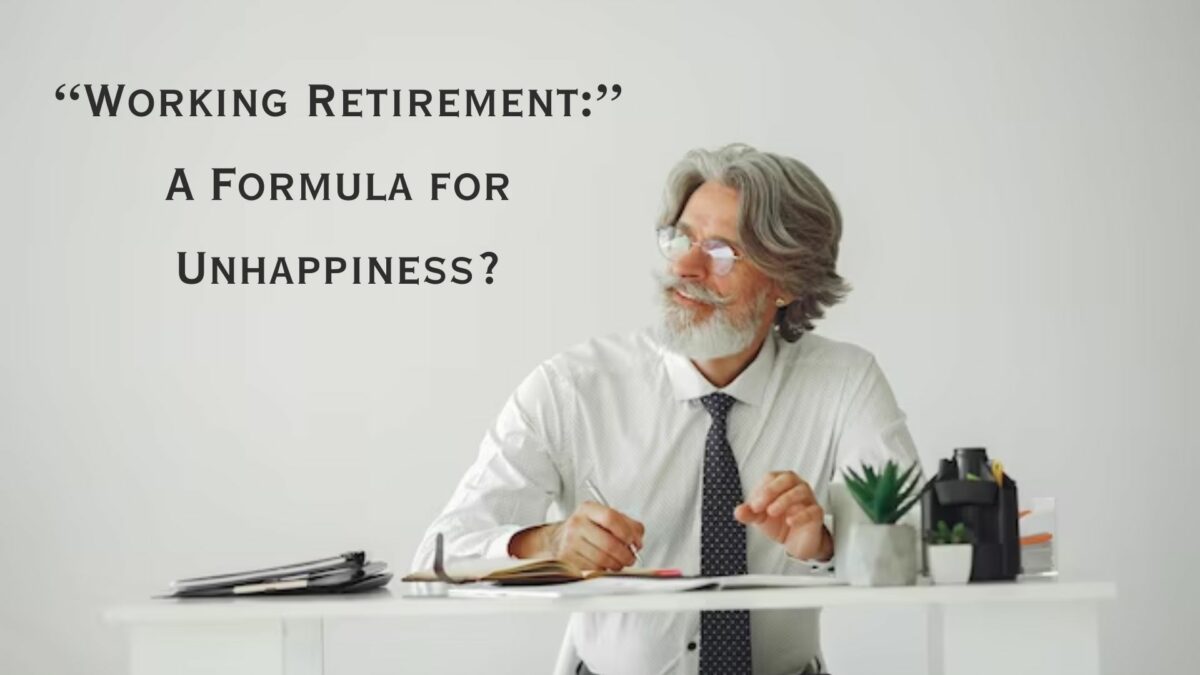“Retirement can be a great joy if you can figure out how to spend time without spending money.”
–Unknown
“The harder you work, the harder it is to surrender.”
–Vince Lombardi
When I make the networking rounds in Fort Worth, one of the questions I always try to ask people is “what do you want to be when you grow up?”
It’s my playful way of asking them what they’re planning on doing when they’re done doing what they’re doing now. In other words, what do they want to do when they retire?
Once they get beyond the hemming and hawing or the “if I had money, I’d hire a financial planner” responses, I find a lot of them haven’t actually thought much about it. Inertia has taken over their lives, and they don’t really consider what life beyond the horizon will look like.
After a few seconds of contemplation, many of them answer with something similar to this:
I don’t know. I’ll probably keep a part-time job just to stay busy.
They have half of the equation right, but the part that they have wrong will make them a lot less happy than they could be.
Does a Part Time Job in Retirement Mean Full Time Misery?

There are two primary reasons why people would continue to work in retirement (though, arguably, if you’re working, you’re not actually retired):
- They need the money, or
- They want to keep mentally sharp.
Both of those reasons have sound logical underpinnings for the decision to pursue part-time employment in later years.
Both of them lead people to the wrong conclusions.
Let’s look at the logic behind each of these reasons.
I need the money, so I’ll work some in retirement.
For the people who come to this decision in their lives, they are facing one of several possible scenarios that causes them to think they should work more, and, in some cases, they’re correct.
- They don’t have enough money accumulated to have a safe withdrawal rate. If they can’t make ends meet without significant risk of depleting all of their assets, then they probably need more money, and work will a) delay drawing on those assets because it b) provides a current income.
- They don’t want to decrease their standard of living. This is a choice people make, even though they likely overestimate the pain of dialing back the monetarily-linked lifestyle. They worked hard to attain a certain lifestyle, and they want to continue to maintain that lifestyle – a very reasonable desire.
- They don’t account for spending changes as they age. They take their current spending, add a little inflation each year, and project ad infinitum. However, research shows (linked at the end of the article) that spending declines at about age 75, and for the properly insured, hits a plateau.
People in these situations could reasonably, but incorrectly, conclude that they should continue to work some in retirement.
I don’t want to sit on a couch and rot.
Rightly so, some people fear a lack of mental challenge and the incipient decline that it would portend. Therefore, they conclude, they should continue to do some work in order to keep their minds sharp. Mental stimulation and activity is one of the keys to maintaining vitality as we age. Lower activity leads to lower satisfaction in retirement. As Neil Young once sang, it’s better to burn out than to fade away.
Both causes of concern are legitimate for potential retirees.
But, the conclusion that part-time work in retirement will solve those issues is the wrong one.
Why part-time work in retirement means full-time misery
As we examined in “Make a Decision and Make Monkey Brain Stick to It,” we have a hard time with creating closure in our lives. If we don’t create closure over a decision, then we’re going to constantly reevaluate our decision and wonder whether or not we made the right decision.
Instead of gaining the benefits of retirement, we’ve merely slotted retirement into the back of our minds, initiating the Zeigarnik Effect, and making us unhappy.
We still have the stress of work and consider ourselves, for mental purposes, employed, without getting the benefits of full-time employment. Furthermore, instead of defining ourselves as who we are (a soccer fan, a traveler, a dog lover, etc.), which will cause us more inherent happiness, we continue to define ourselves as what we are (an HR professional, a doctor, a salesperson, Fort Worth financial planner, etc.).
The solution to this problem is quite simple.
Don’t work in retirement.
If you don’t have enough money to live off of your assets in retirement, then continue to work full-time until you do. Don’t know how much money you need to get to that point? Please fill in the contact form, and I will connect you with a financial planner.
Furthermore, by working in retirement for the money, you’re delaying your actual retirement by many more years. Let’s say that by working full-time, you could retire in another 5 years or by working part-time, you could truly retire in 10 years. In either case, mentally, you’ll be working at least five years, but if you continue to work part-time, you’re going to be mentally committed to your job for another ten years. You’ll be delaying your happiness by another five years.
If you do have enough money to live off of in retirement and want to keep your mind stimulated, then find hobbies that you enjoy and which provide some mental challenge, but not an extensive challenge. You’ll be happier with moderate mental stimulation than with overly onerous and taxing mental challenges.
If you want to read more about some of the studies on happiness in retirement and also about retirees’ spending habits, Professor Michael Finke of Texas Tech University has an excellent summary article here.
Were you planning on working some in retirement? Has this article changed your mind? Let’s talk about it in the comments below!
Author Profile
- John Davis is a nationally recognized expert on credit reporting, credit scoring, and identity theft. He has written four books about his expertise in the field and has been featured extensively in numerous media outlets such as The Wall Street Journal, The Washington Post, CNN, CBS News, CNBC, Fox Business, and many more. With over 20 years of experience helping consumers understand their credit and identity protection rights, John is passionate about empowering people to take control of their finances. He works with financial institutions to develop consumer-friendly policies that promote financial literacy and responsible borrowing habits.
Latest entries
 Low Income GrantsSeptember 25, 2023How to Get a Free Government Phone: A Step-by-Step Guide
Low Income GrantsSeptember 25, 2023How to Get a Free Government Phone: A Step-by-Step Guide Low Income GrantsSeptember 25, 2023Dental Charities That Help With Dental Costs
Low Income GrantsSeptember 25, 2023Dental Charities That Help With Dental Costs Low Income GrantsSeptember 25, 2023Low-Cost Hearing Aids for Seniors: A Comprehensive Guide
Low Income GrantsSeptember 25, 2023Low-Cost Hearing Aids for Seniors: A Comprehensive Guide Low Income GrantsSeptember 25, 2023Second Chance Apartments that Accept Evictions: A Comprehensive Guide
Low Income GrantsSeptember 25, 2023Second Chance Apartments that Accept Evictions: A Comprehensive Guide

